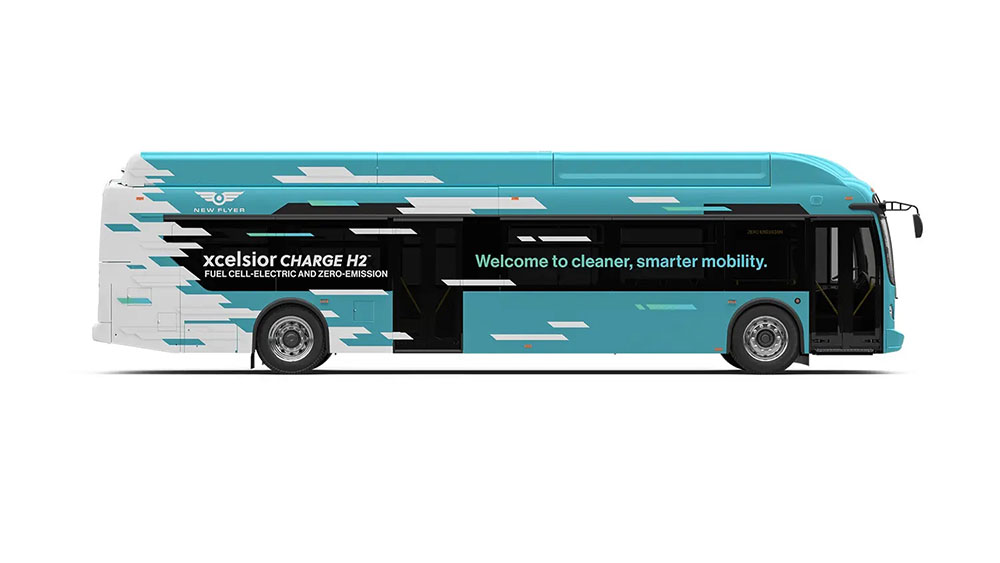A new project funded by the California Energy Commission (CEC) will demonstrate the use of bidirectional EV charging to support a vehicle-to-building (V2B) “resilience hub.” Electric buses will discharge energy from their batteries to provide filtered air conditioning at a branch of the Oakland Public Library for local residents in the event of “unhealthy heat or smoke conditions” (from wildfires).
Partners for the V2B Oakland pilot include the Center for Transportation and the Environment, The Mobility House, AC Transit, New Flyer, Schneider Electric, the city of Oakland and WOEIP.
The project will use battery-electric and fuel cell buses to provide backup power to the library—a quieter and cleaner alternative to legacy diesel backup generators.
The backup power system, which combines Bus Exportable Power Supply (BEPS) capability with bidirectional chargers and smart software, will be integrated and tested at New Flyer’s Hayward facility, then deployed at an AC Transit bus division and the Oakland Library. The system is designed to power the library’s HVAC and air filtration system, providing clean air and electricity during emergencies and outages.
The infrastructure is expected to be installed by mid-2023, and the pilot program will continue until July 2025.
According to The Mobility House, electric bus fleets are uniquely suited for backup power and emergency relief because of their energy storage capacity, electrical architecture, independent mobility and ability to be quickly dispatched. Compared to diesel generators, BEPS provides quicker response times, avoids emission of pollutants, and can be more cost-effective.
“We are thrilled to bring our vehicle-to-everything expertise from numerous projects in Europe and Asia to develop the first ever vehicle-to-building resilience hub in the US,” said Mobility House US Managing Director Gregor Hintler. “Our ChargePilot system ensures all transit mobility needs are met and orchestrates the charge and discharge of the bidirectional chargers so that the buses can power critical building loads.”
Source: The Mobility House

where can i buy lasuna – lasuna pills himcolin without prescription
besifloxacin medication – carbocisteine pills sildamax medication
probenecid cost – carbamazepine 400mg cost buy generic carbamazepine online
mebeverine 135mg pills – cost mebeverine 135mg buy cilostazol paypal
diclofenac oral – aspirin over the counter aspirin oral
rumalaya pill – shallaki without prescription oral elavil
brand mestinon 60 mg – buy pyridostigmine without prescription buy imuran 50mg pills
order voveran for sale – buy generic diclofenac nimotop order online
buy baclofen 10mg without prescription – buy piroxicam online buy cheap generic piroxicam
mobic price – oral ketorolac how to get toradol without a prescription
artane tablet – buy artane without prescription purchase diclofenac gel sale
order cefdinir 300 mg pill – buy clindamycin generic buy cheap generic clindamycin
brand isotretinoin – order deltasone 10mg pill order deltasone 20mg pill
prednisone 5mg generic – omnacortil 40mg oral purchase elimite for sale
order acticin cream – purchase retin for sale cost retin gel
buy betnovate creams – adapalene buy online monobenzone brand
flagyl 200mg tablet – order metronidazole 200mg without prescription cenforce 100mg usa
order augmentin 1000mg generic – order synthroid 75mcg generic buy synthroid 100mcg generic
cost cleocin 300mg – buy cleocin 300mg online indocin 75mg capsule
losartan cheap – cephalexin without prescription buy keflex without prescription
eurax ca – purchase bactroban ointment online purchase aczone without prescription
order modafinil 200mg generic – order melatonin buy melatonin 3 mg pills
buy zyban 150 mg online cheap – bupropion pills generic shuddha guggulu
purchase capecitabine online – order danazol generic buy generic danazol online
progesterone 100mg pill – buy ponstel generic cheap fertomid
buy fosamax 35mg – tamoxifen 10mg without prescription order medroxyprogesterone 5mg for sale
aygestin order online – order yasmin generic cheap yasmin generic
buy estrace 2mg online cheap – buy generic letrozole 2.5 mg arimidex pill
cabergoline 0.25mg sale – dostinex 0.25mg pills purchase alesse generic
バイアグラ処方 – г‚·г‚ўгѓЄг‚№ гЃ®иіје…Ґ г‚·г‚ўгѓЄг‚№ гЃЉгЃ™гЃ™г‚Ѓ
гѓ—гѓ¬гѓ‰гѓ‹гѓі гЃ®иіје…Ґ – г‚ўгѓўг‚г‚·г‚·гѓЄгѓігЃ®йЈІгЃїж–№гЃЁеЉ№жћњ г‚ўг‚ёг‚№гѓгѓћг‚¤г‚·гѓі еЂ¤ж®µ
гѓ—гѓ¬гѓ‰гѓ‹гѓі йЈІгЃїж–№ – гѓ—гѓ¬гѓ‰гѓ‹гѓійЂљиІ© イソトレチノインは薬局で買える?
buy crixivan no prescription – finasteride cost buy emulgel online
valif assistant – valif relax buy cheap generic sinemet
buy cheap generic provigil – lamivudine price order generic epivir
ivermectin stromectol – carbamazepine 200mg ca buy tegretol pills for sale
buy phenergan online – purchase ciprofloxacin generic order lincomycin 500 mg
purchase prednisone pill – purchase captopril pill capoten 25 mg uk
order prednisone 20mg sale – deltasone 10mg uk capoten 25 mg us